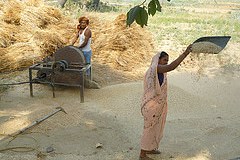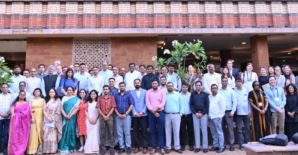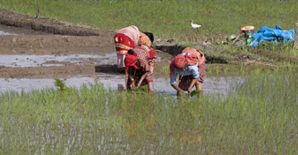The challenge of ensuring food security in Bihar is complex. The proportion of underweight children in the state is nearly 50 percent. One quarter of the population is not able to get 75 percent of the required calories, while the deficiency in micronutrient and vitamin intake is more severe. Despite having abundant natural resources, Bihar is vulnerable to floods and drought almost every year, and low productivity and huge yield gaps result in fluctuating agricultural production.
In August, the A N Sinha Institute of Social Studies (ANSISS) and the International Food Policy Research Institute (IFPRI) organized a one-day workshop in Patna Bihar titled, A Food Secure Bihar: Challenges and the Way Forward. The aim was to understand the National Food Security Act (NFSA) in the context of Bihar and outline options and strategies for making the Act efficient and effective in the state.
The NFSA provides 85 and 74 percent, respectively, of the rural and urban population with 25 kg of food grains per month for a family of five. During the workshop, former Bihar Chief Minister Nitish Kumar underscored that the challenges implementing the NFSA are to reach the targeted beneficiaries, remove leakages, and decide on a coupon system versus cash transfers. He stressed that an efficient system to reach the beneficiaries was needed to ensure food security for the poor. Kumar floated the idea, to establish independent regulatory body in the lines of Election Commission to keep check on effective implementation of NFSA and to address the bottlenecks in the system.
With rising population, shifting demand towards high value produce there are immense pressure on small-holder farmers that are major contributors towards agriculture growth in Bihar. The presenters insisted on moving forward with policies to help smallholder farmers. The options include improved irrigation and road infrastructure, the introduction of new technologies and utilization of fallow land, and promoting agri-diversification and bridging yield gaps.
In the view of the social economic environment problems the researchers at the workshop decided to initiate Bihar model of social safety nets program with aim to develop the roadmap that targets to achieve zero hunger by 2020. This would be possible by integrating technology in social safety nets program, increase investment in agriculture, along with the prioritization of a research agenda, innovation, linking farmers to markets and strengthening institution, would pay dividends in the state.
Given the discussion at the workshop, ANSISS and IFPRI plan to study the NFSA and its impact in Bihar.
This workshop is part of IFPRI’s on-going work on the Food Security Portal Partnership and Policy Dialogue in India, which is supported by Swiss Development Corporation. The project is led by IFPRI’s Markets, Trade and Institution Division in collaboration with South Asia Regional office in New Delhi. The first phase covers the states Bihar, Andhra Pradesh and Gujarat.
Link to newspaper clippings
Nitish moots committee to sort out beneficiaries under NFSA
Link to presentations



